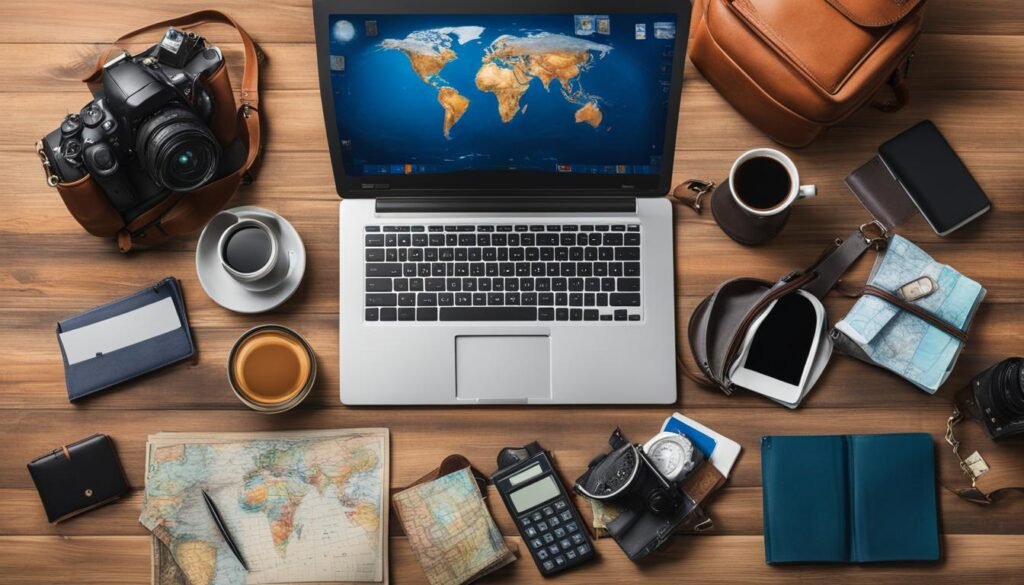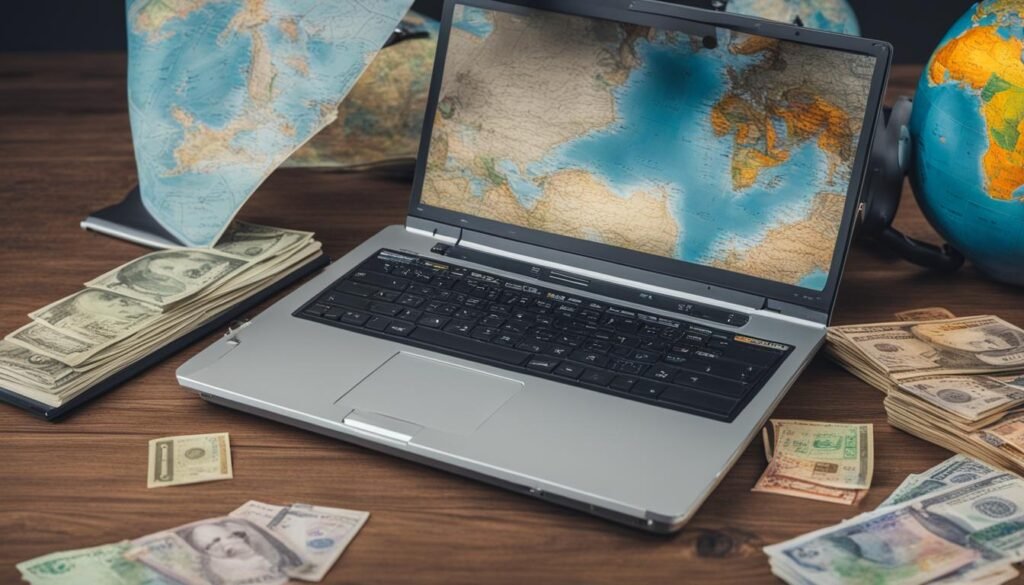Introduction: Digital Nomad Budgeting
Managing a digital nomad budget involves careful planning and adapting to the various costs of living across different locations globally. Strategies to save money on travel, accommodation, food, and other expenses are essential. In this guide, we will explore all aspects of financial management for digital nomads, including monthly essentials, non-monthly recurring expenses, and tips for successful budgeting.
Key Takeaways
- Plan your budget carefully to adapt to the costs of living in different locations.
- Save money on travel, accommodation, food, and other expenses to optimize your finances.
- Track your income and expenses using budgeting tools, spreadsheets, or specialized software.
- Create a realistic and flexible budget based on your actual income and expenses.
- Protect yourself from financial risks by having an emergency fund, diversified income stream, and insurance.
Digital Nomad Budget: Monthly Essentials
When it comes to managing your digital nomad budget, it’s important to consider your monthly essentials. These are the expenses that you need to budget for every month in order to maintain your lifestyle and work remotely. Here are some of the key monthly expenses that you should take into account:
Accommodation Costs
Accommodation costs will vary depending on your location and personal preference. Whether you choose to stay in hostels, rent an apartment, or opt for co-living spaces, it’s essential to budget for these expenses. Research the average rental prices in your desired location and factor in the cost of utilities.
Electricity Costs
Electricity expenses will depend on your power usage. If you work from home or use a lot of electronic devices, your electricity bill may be higher. Consider using energy-efficient appliances and turning off electronics when not in use to minimize costs.
Wi-Fi/Internet Expenses
As a digital nomad, reliable Wi-Fi/internet is crucial for your work. Research the availability and cost of internet plans in your chosen location. Some co-working spaces or cafes may offer free Wi-Fi, while others may charge a fee.
Water Expenses
Water costs can vary greatly depending on the location and local rates. Some destinations may have high water costs, while others may offer affordable options. Research the local water rates and factor this into your monthly budget.
Laundry Costs
Laundry expenses can add up, especially if you rely on laundry services or laundromats. Consider budgeting for these costs, or invest in a portable washing machine if you prefer to do your own laundry.
Food and Drink Expenses
Food and drink costs should also be factored into your monthly budget. Eating out regularly can be expensive, so consider cooking your own meals or finding affordable local eateries. Research the average cost of groceries in your destination and plan your budget accordingly.
Total Monthly Budget for Essentials
When calculating your total monthly budget for essentials, consider all of the above expenses and any other recurring costs that are specific to your lifestyle. This will give you a clear idea of how much you need to set aside each month to cover your basic needs.

| Expense | Estimated Monthly Cost |
|---|---|
| Accommodation | $800 |
| Electricity | $50 |
| Wi-Fi/Internet | $50 |
| Water | $20 |
| Laundry | $30 |
| Food and Drink | $400 |
| Total | $1,350 |
Note: The estimated monthly costs provided in the table are just examples and will vary depending on your location and lifestyle choices.
Digital Nomad Budget: Non-Monthly Recurring Essentials
As a digital nomad, managing your budget goes beyond monthly expenses. It’s important to consider non-monthly recurring essentials to ensure long-term financial stability. These expenses include toiletries costs, clothing expenses, shoe expenses, computer equipment costs, specialist tools expenses, and visa fees.
Table: Non-Monthly Recurring Essentials
| Expense | Estimated Cost |
|---|---|
| Toiletries | $50 – $100 per month |
| Clothing | $100 – $200 per month |
| Shoes | $50 – $150 per pair |
| Computer Equipment | Varies depending on needs |
| Specialist Tools | Varies depending on profession |
| Visa Fees | Varies depending on destination |
When budgeting for non-monthly recurring essentials, consider setting aside a specific amount each month to cover these expenses. By planning ahead, you can avoid financial strain and ensure that you have the necessary funds when these expenses arise.
Additionally, it’s important to research and compare prices for computer equipment and specialist tools to make informed purchasing decisions. Visa fees can also vary depending on the destination, so be sure to factor these costs into your budget when planning your travels.
By accounting for non-monthly recurring essentials in your digital nomad budget, you can maintain financial stability and ensure that you have the necessary resources to support your lifestyle and career.

Tracking Income and Expenses
One of the key aspects of effective budgeting as a digital nomad is tracking your income and expenses. By closely monitoring your financial transactions, you can gain a clear understanding of where your money is coming from and where it’s going. Tracking income and expenses allows you to make informed decisions, identify areas where you can cut back or save, and ultimately maintain financial stability while living a nomadic lifestyle.
There are various tools and methods available to help you track your finances. One popular option is using budgeting apps, which allow you to log your income and expenses, categorize them, and view detailed reports. These apps often come with features such as automatic expense tracking, bill reminders, and spending insights, making it easier to stay on top of your financial situation. Additionally, spreadsheets can be a simple yet effective tool for tracking income and expenses. You can create your own customized spreadsheet or use pre-made templates to organize and analyze your financial data.
When tracking your income and expenses, it’s important to categorize your transactions accurately. This helps you understand your spending patterns and identify any areas where you might be overspending. Common expense categories for digital nomads include accommodation, transportation, food, entertainment, and work-related expenses such as coworking space fees or equipment purchases. By categorizing your transactions, you can easily see how much you’re spending in each area and make adjustments as needed.
Table: Example Expense Categories
| Category | Description |
|---|---|
| Accommodation | Expenses related to housing, including rent, utilities, and maintenance fees. |
| Transportation | Costs associated with travel, including flights, public transportation, and car rentals. |
| Food | Spending on groceries, dining out, and ordering takeout. |
| Entertainment | Expenses for leisure activities, such as movie tickets, concerts, or sightseeing. |
| Work-related | Costs necessary for your remote work, such as internet fees, software subscriptions, or equipment. |
By implementing tracking methods and tools, you can gain a comprehensive view of your income and expenses, allowing you to make informed decisions about your budget. Whether you choose to use budgeting apps, spreadsheets, or a combination of both, the key is to regularly review your financial data, identify any areas where you can improve, and make adjustments accordingly. By staying on top of your finances, you can maintain control of your budget and ensure long-term financial stability as a digital nomad.
Creating a Realistic and Flexible Budget
When it comes to managing your finances as a digital nomad, creating a realistic and flexible budget is key. By establishing a budget that is based on your actual income and expenses, you can better track your financial health and make informed decisions about your spending habits. Here are some budgeting methods that can help you effectively manage your digital nomad budget:
The 50/30/20 Rule
The 50/30/20 rule is a popular budgeting method that suggests allocating 50% of your income to essential expenses, 30% to discretionary spending, and 20% to savings or debt repayment. This method provides a balanced approach to budgeting, allowing you to enjoy your nomadic lifestyle while still saving for the future. By following this rule, you can maintain a realistic budget that aligns with your financial goals.
Zero-Based Budgeting
Zero-based budgeting requires you to allocate every dollar of your income to a specific purpose. With this method, you start with a blank slate each month and assign your income to various categories such as housing, transportation, food, and entertainment. By giving every dollar a purpose, you can ensure that your budget is optimized and that you are making intentional choices about your spending habits.
The Envelope System
The envelope system is a cash-based budgeting method that involves dividing your expenses into different categories and using physical envelopes to hold the cash for each category. For example, you might have envelopes for groceries, dining out, transportation, and entertainment. By using cash, you can visually see how much money you have left in each category and avoid overspending. The envelope system can be a helpful tool for creating a flexible budget and managing your expenses on the go.
By implementing these budgeting methods, you can create a realistic and flexible budget that allows you to live your digital nomad lifestyle while still maintaining financial stability. Remember to regularly review and adjust your budget as circumstances change, and always prioritize saving for your future financial goals.

| Budgeting Method | Description |
|---|---|
| 50/30/20 Rule | Allocates 50% of income to essential expenses, 30% to discretionary spending, and 20% to savings or debt repayment. |
| Zero-Based Budgeting | Requires allocating every dollar of income to a specific purpose, ensuring intentional spending choices. |
| Envelope System | Uses physical envelopes to hold cash for different expense categories, providing visual reminders of spending limits. |
Saving Money on Travel Costs
As a digital nomad, travel expenses can form a significant portion of your budget. However, there are several strategies you can employ to save money and make the most of your travel experiences while staying within your budget.
One effective way to save money on travel is to consider traveling during off-seasons or low-demand periods. During these times, you can often find better deals on flights, accommodation, and tourist attractions. Not only will you save money, but you’ll also avoid the crowds and have a more authentic experience in your chosen destinations.
Comparison websites are another valuable resource for digital nomads looking to save money on travel. These websites allow you to compare prices across multiple airlines, hotels, and online travel agencies, helping you find the best deals available.
Table: Comparison of Travel Expenses
| Expense Category | Costs |
|---|---|
| Flights | Varies depending on destination and time of booking |
| Accommodation | Varies depending on location, type of accommodation, and season |
| Transportation | Varies depending on mode of transportation (e.g., flights, trains, buses) |
| Tourist Attractions | Varies depending on the destination and type of attraction |
When it comes to transportation, considering alternative modes can help you save money. Opting for buses or trains instead of flights can often be more cost-effective, especially for shorter distances. Additionally, taking advantage of loyalty programs offered by airlines, hotels, and car rental companies can help you earn rewards and save money on future travel expenses.
Finally, travel insurance is an essential investment for all digital nomads. While it may seem like an additional expense, having travel insurance can protect you from unexpected events such as medical emergencies, trip cancellations, or lost luggage. By being prepared for these situations, you can avoid significant financial burdens down the line.

Choosing the Best Banking and Payment Options

As a digital nomad, managing your banking and payment options is crucial for smooth financial operations. By selecting the right options, you can minimize fees, ensure global accessibility, and streamline your transactions. Here are some key considerations:
1. Online Banks and Fintech Platforms
Consider opting for online banks or fintech platforms that offer low fees and convenient features tailored to the needs of digital nomads. These platforms provide easy access to your funds from anywhere in the world and often offer competitive currency exchange rates.
2. Multiple Debit/Credit Cards
Having multiple debit and credit cards can be useful when traveling internationally. Look for cards that do not charge foreign transaction fees and offer additional benefits such as travel insurance or rewards programs. Having backup cards can also provide peace of mind in case of loss or theft.
3. Online Payment Platforms
Using online payment platforms can simplify your financial transactions while traveling. Services like PayPal or TransferWise allow you to send and receive money internationally with ease. These platforms typically offer currency conversion at competitive rates.
4. Cryptocurrency
For those who embrace the digital revolution, cryptocurrency can be an alternative payment option. Some businesses and freelancers accept cryptocurrency as payment, allowing you to avoid traditional banking fees and currency exchange rates.
By carefully considering your banking and payment options, you can optimize your financial management as a digital nomad. Remember to assess the fees, accessibility, and benefits of each option to make an informed decision that supports your nomadic lifestyle.
Digital Nomad Budget: Protecting Yourself from Financial Risks
Being a digital nomad comes with its own set of financial risks, but with careful planning and preparation, you can protect yourself and your finances. Here are some key steps you can take to mitigate these risks:
1. Build an Emergency Fund
Having an emergency fund is crucial for financial stability. As a digital nomad, unexpected expenses such as medical emergencies, equipment repairs, or sudden travel changes can arise. Aim to save at least three to six months’ worth of living expenses in an easily accessible and separate account.
2. Diversify Your Income Stream
Relying solely on one source of income can be risky. Explore opportunities to diversify your income by taking on multiple clients or projects, creating passive income streams, or investing in income-generating assets. Diversification can provide a safety net and ensure a more stable financial situation.
3. Invest in Insurance
Insurance is an essential aspect of protecting yourself from financial risks. Consider acquiring travel insurance that covers medical emergencies, trip cancellations, and lost belongings. Additionally, explore options for health insurance and liability insurance, depending on your specific needs and circumstances.
4. Secure Important Legal Documents
As a digital nomad, it’s crucial to have your legal documents in order. Make sure your passport is valid and easily accessible. Have backups of important documents such as identification cards, visas, and health records. Storing copies of these documents in secure cloud storage can provide peace of mind and easy access in case of emergencies.
Summary Table: Protecting Yourself from Financial Risks
| Step | Description |
|---|---|
| Build an Emergency Fund | Save at least three to six months’ worth of living expenses in a separate account. |
| Diversify Your Income Stream | Explore multiple sources of income to ensure financial stability. |
| Invest in Insurance | Secure travel insurance, health insurance, and liability insurance. |
| Secure Important Legal Documents | Maintain a valid passport and have copies of essential documents stored securely. |

By following these steps, you can safeguard yourself from potential financial risks and enjoy a more secure and stress-free digital nomad lifestyle.
Investing Your Money Wisely
As a digital nomad, it’s important to make wise investment decisions to ensure long-term financial growth and security. By allocating your money into different assets and diversifying your portfolio, you can minimize risks and maximize returns. When planning for retirement, it’s crucial to consider your investment options and choose strategies that align with your financial goals and risk tolerance.
Asset Allocation and Diversification
When it comes to investing as a digital nomad, asset allocation and diversification are key principles to understand. Asset allocation involves spreading your investments across different asset classes such as stocks, bonds, real estate, and cryptocurrency. This strategy helps to balance risk and reward, as different asset classes perform differently in various market conditions.
Diversification, on the other hand, involves spreading your investments within each asset class. By investing in a variety of companies, industries, and geographic regions, you can minimize the impact of any single investment on your overall portfolio. This reduces risk and increases the potential for long-term growth.
Retirement Planning and Investment Options
Planning for retirement is essential for digital nomads who want to maintain financial stability in the long run. While traditional retirement accounts, such as Individual Retirement Accounts (IRAs) and 401(k)s, may not be available for all nomads, there are still viable options to consider.
One option is to open a self-employed retirement account, such as a Simplified Employee Pension (SEP) IRA or a Solo 401(k). These accounts allow you to contribute and invest a portion of your income for retirement, providing tax advantages and potential growth over time. Another option is to invest in taxable brokerage accounts, where you have more flexibility and control over your investments.
When choosing investment options, it’s essential to conduct thorough research, seek professional advice if needed, and stay updated on market trends. By staying informed and making informed investment decisions, you can optimize your finances as a digital nomad and secure a comfortable retirement.

Table: Investment Options
| Investment Option | Risk Level | Potential Return |
|---|---|---|
| Stocks | High | High |
| Bonds | Low to Medium | Low to Medium |
| Real Estate | Medium | Medium to High |
| Cryptocurrency | High | High |
Note: The risk level and potential return of each investment option may vary based on market conditions and individual circumstances. It’s important to assess your risk tolerance and conduct thorough research before making any investment decisions.
Conclusion
Managing your finances as a digital nomad is crucial to achieving financial stability and enjoying the freedom of your nomadic lifestyle. By implementing effective budgeting strategies and financial planning, you can optimize your finances and make the most of your location-independent lifestyle.
Start by considering your monthly essentials, such as accommodation, electricity, Wi-Fi, water, laundry, and food expenses. Create a budget that suits your individual needs and preferences, and regularly review and adjust it as circumstances change.
In addition to monthly expenses, don’t forget to budget for non-monthly recurring essentials like toiletries, clothing, shoes, computer equipment, specialist tools, and visa fees. These expenses are crucial for long-term financial planning and stability.
Remember to track your income and expenses using budgeting tools, spreadsheets, or specialized software. By accurately tracking your finances, you can make informed financial decisions and stay on top of your budget.
Furthermore, saving money on travel costs, choosing the best banking and payment options, protecting yourself from financial risks, and investing your money wisely are all important steps in achieving financial stability as a digital nomad. With careful planning and mindful spending, you can optimize your finances and enjoy the financial freedom that comes with the digital nomad lifestyle.
FAQ
What expenses should digital nomads consider on a monthly basis?
Digital nomads should consider accommodation costs, electricity expenses, Wi-Fi/internet expenses, water costs, laundry expenses, and food and drink expenses on a monthly basis.
What are non-monthly recurring essentials for digital nomads?
Non-monthly recurring essentials for digital nomads include toiletries costs, clothing expenses, shoe expenses, computer equipment costs, specialist tools expenses, and visa fees.
How can digital nomads track their income and expenses?
Digital nomads can use budgeting apps, spreadsheets, or specialized software to track their income and expenses. Categorizing, recording promptly, and reviewing spending patterns are important steps in tracking financials.
What is the key to creating a realistic and flexible budget as a digital nomad?
The key is to base the budget on actual income and expenses, include all necessary costs, and regularly review and adjust the budget as circumstances change. Different budgeting methods can be utilized, such as the 50/30/20 rule, zero-based budgeting, or the envelope system.
How can digital nomads save money on travel costs?
Digital nomads can save money on travel costs by considering off-season travel, using comparison websites to find the best deals, opting for alternative modes of transportation, taking advantage of loyalty programs, and investing in travel insurance.
What banking and payment options are best for digital nomads?
Digital nomads can choose online banks or fintech platforms that offer low fees and global access. Having multiple debit/credit cards with no foreign transaction fees can help avoid unnecessary charges. Online payment platforms and cryptocurrency can be used for seamless transactions.
How can digital nomads protect themselves from financial risks?
Digital nomads can protect themselves by having an emergency fund, maintaining a diversified income stream, investing in insurance, and ensuring the availability of legal documents.
What investment options should digital nomads consider?
Digital nomads can consider different investment options such as stocks, bonds, real estate, or cryptocurrency based on their risk tolerance and financial goals. Diversification and retirement planning should be key considerations in the investment strategy.
What is the importance of managing finances for digital nomads?
Managing finances is crucial for digital nomads to achieve financial stability and enjoy the freedom of their nomadic lifestyle. Proper financial planning allows digital nomads to optimize their finances and make the most of their location-independent lifestyle.
